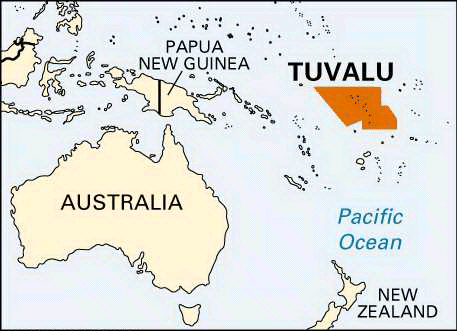Tuvalu
Area 4 square mi (10 square km)
Population 9,893 2014
Capital Funafuti
Highest Point 15 ft (4.6 m)
Lowest Point 0 m
GDP $37.86 million 2014
Primary Natural Resources copra, fisheries, tourism, coconuts.
TUVALU IS ONE OF the world's smallest sovereign nations and remote countries. Tuvalu is a group of nine atolls scattered between the 501,932 square mi (1,300,000 square km) of the western PACIFIC OCEAN between KIRIBATI and the Samoan Islands. The nine islands consist of five low-lying coral atolls and four pinnacles that jut out of the ocean.
The significance of the geology of Tuvalu has been recognized for many years, with expeditions being sent from Great Britain to the islands as early as 1900. The existence of coral rock formations submerged to depths of more than 984 ft (300 m) has been explained by the coral forming over a slowly submerging volcano.

Tuvalu's climate is tropical, moderated by trade winds. The temperature averages around 86 degrees F (30 degrees C) with little seasonal variation, though the wet season is long (October to March) and humid. In response to the global climate change, Tuvalu's underground water table is threatened as the highest point in Tuvalu is just 15 ft (4.6 m) above sea level. Excessive clearance of forest undergrowth has also caused environmental concerns, and there is damage to coral reefs from the spread of the crowns of thorns starfish. There are no native mammals on Tuvalu; the only mammals are the introduced species of dog, pig, chicken, and Polynesian rat. Humans have lived on the islands for as long as 8,000 years. The islands had an estimated pre-1900 population of no more than 3,000. Presently, there are 11,146 Tuvaluans, of whom 96 percent are Polynesian and 4 percent Micronesian. The majority of the population are Christian.
The islands were named the Ellice Islands in 1819. In order to protect its inhabitants from Peruvian slavers, the British annexed the islands and formed a protectorate with the Gilbert Islands in 1892. During World War II, the Japanese invasion into the Pacific reached as far as the Gilbert Islands, just to the north of Tuvalu, and the UNITED STATES established a defensive post and built airfields and bunkers on the islands.
In 1974, ethnic differences between the Micronesian Gilbertese and Polynesian Ellice led the islanders to vote for separation. In preparation for independence, the British government granted Tuvalu self-governance and, in 1978, the nation was granted independence and adopted its precolonial name of Tuvalu, meaning “eight standing together” (although the group actually contains nine islands). Tuvalu became the 38th member of the British Commonwealth and, in 2000, the 189th member of the United Nations organization.
Tuvalu's main industries are fisheries, copra, and tourism. Development aid is provided through the Tuvalu Trust Fund, which was established by AUSTRALIA, Britain, South KOREA, and NEW ZEALAND in 1987. The economy also benefits from a 1988 fisheries treaty signed with the United States, which contributes around $9 million to the gross domestic product (GDP) each year.
Telecommunications are a significant earner for the local economy, after the leasing of its area code for “900” numbers and the contract leasing of its internet domain name, “.tv,” for $50 million in royalties annually over a 12-year period. Remittance from overseas workers is another major contributor to the country's economy.